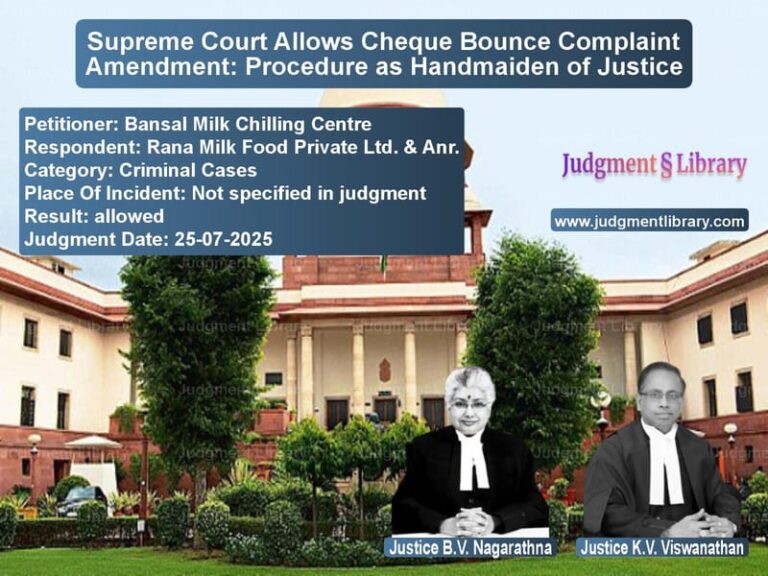Land Acquisition Dispute: Supreme Court Upholds Hubli-Dharwad Urban Development Authority’s Acquisition
The Supreme Court of India, in the case of Hubli-Dharwad Urban Development Authority v. Shekhargowda Chennabasannagowda Phakirgowdar & Another, delivered a significant judgment on October 3, 2016, addressing the legality of land acquisition under the Karnataka Urban Development Authority Act, 1987. This case revolved around the acquisition of land for a housing scheme and the subsequent legal challenge by the landowner, who claimed the acquisition process was flawed due to non-service of notice and failure to consider objections.
The Supreme Court set aside the Karnataka High Court’s judgment, which had quashed the land acquisition proceedings. The Court upheld the validity of the acquisition, emphasizing that the objections of landowners must be properly filed for consideration and that procedural lapses do not automatically invalidate the acquisition process.
Background of the Case
The dispute arose over the acquisition of 54 acres and 39 guntas of land in Byridevana Koppa Village, Hubli Taluk, including 2 acres and 36 guntas owned by the respondent. The land was acquired for a housing development project by the Hubli-Dharwad Urban Development Authority (HDUDA). The notification under Section 17(3) of the Karnataka Urban Development Authority Act was issued on February 6, 2002, followed by a declaration under Section 19(3) on November 27, 2003.
The respondent, claiming that he was unaware of the acquisition due to lack of proper notice, challenged the acquisition before the Karnataka High Court. He argued that the authorities had failed to consider his objections and that he remained in possession of the land, which was not used for the proposed housing scheme.
Arguments Presented
Petitioners’ (Respondent’s) Arguments
- The acquisition was invalid as the authorities did not personally serve notice or consider objections.
- The respondent remained in possession of the land, which included a farmhouse, cattle shed, and a mobile tower.
- The housing scheme was not implemented in relation to the acquired land, making the acquisition unnecessary.
Appellant’s (Hubli-Dharwad Urban Development Authority) Arguments
- The acquisition was legally valid, and notices were published in newspapers and gazettes.
- The respondent had refused to accept the notice when it was personally served.
- The objections of landowners who had submitted them were duly considered.
- Possession was legally taken over, evidenced by a Panchnama and a notification under Section 16(2) of the Land Acquisition Act, 1894.
Supreme Court’s Judgment
The Supreme Court ruled in favor of the appellant, setting aside the Karnataka High Court’s order that quashed the land acquisition. The key observations of the Court included:
- On Service of Notice: The Court held that the respondent was duly notified through newspaper publications and gazette notifications, and his refusal to accept the notice did not invalidate the acquisition.
- On Consideration of Objections: The Court found no record of the respondent submitting formal objections, making the claim of non-consideration irrelevant.
- On Possession of Land: The Court accepted the Panchnama and notification under Section 16(2) as conclusive proof that possession was taken.
- On Implementation of the Housing Scheme: The Court noted that the respondent’s land was earmarked for civic amenities, refuting claims that the acquisition was unutilized.
The Court stated: “The High Court has committed an error in holding that the First Respondent filed his objections which were not considered.”
Legal Precedents Cited
The Court referred to key judgments on land acquisition and procedural requirements:
- State of Tamil Nadu v. Ananthi Ammal: Emphasized that acquisition for public purposes cannot be challenged merely on procedural grounds.
- Sooraram Pratap Reddy v. Collector, Hyderabad: Held that once possession is taken and utilized for public purposes, acquisition cannot be reversed.
- Balwant Narayan Bhagde v. M.D. Bhagwat: Stated that a notification under Section 16(2) of the Land Acquisition Act, 1894 is valid evidence of possession.
Impact of the Judgment
The ruling clarifies critical aspects of land acquisition law:
- Proper Notice Is Key: Landowners must respond to acquisition notices within stipulated timelines; refusal to accept notice does not invalidate the process.
- Objections Must Be Filed: Authorities are only required to consider objections that are formally submitted.
- Possession Matters: Once possession is taken and recorded under Section 16(2), landowners cannot claim continued ownership.
- Development Plans Are Legitimate: If land is earmarked for civic amenities, courts will not interfere with its acquisition.
This judgment reinforces that land acquisitions for public purposes must be challenged with substantive evidence rather than procedural technicalities.
Conclusion
The Supreme Court’s decision in Hubli-Dharwad Urban Development Authority v. Shekhargowda Chennabasannagowda Phakirgowdar reaffirms that land acquisition laws must be interpreted in favor of public interest. The ruling ensures that legal challenges to land acquisition must be based on concrete evidence rather than claims of procedural lapses.
By upholding the validity of the acquisition, the Court has reinforced the principle that once possession is taken and land is designated for public use, it cannot be arbitrarily reversed. This decision serves as a critical precedent for future land acquisition disputes, ensuring that urban development projects proceed without undue legal hindrance.
Don’t miss out on the full details! Download the complete judgment in PDF format below and gain valuable insights instantly!
Download Judgment: Hubli-Dharwad Urban vs Shekhargowda Chennab Supreme Court of India Judgment Dated 03-10-2016.pdf
Direct Downlaod Judgment: Direct downlaod this Judgment
See all petitions in Property Disputes
See all petitions in Landlord-Tenant Disputes
See all petitions in Damages and Compensation
See all petitions in Judgment by Anil R. Dave
See all petitions in Judgment by L. Nageswara Rao
See all petitions in allowed
See all petitions in supreme court of India judgments October 2016
See all petitions in 2016 judgments
See all posts in Civil Cases Category
See all allowed petitions in Civil Cases Category
See all Dismissed petitions in Civil Cases Category
See all partially allowed petitions in Civil Cases Category







